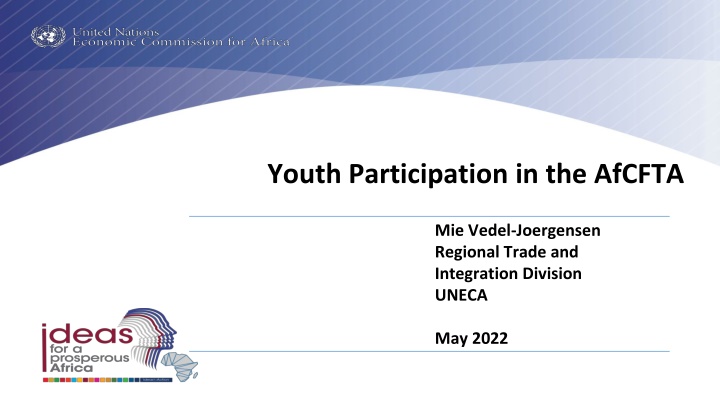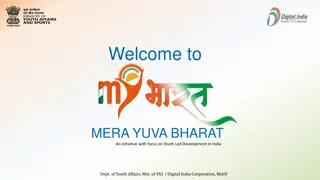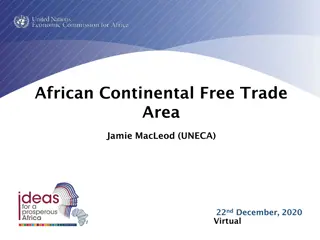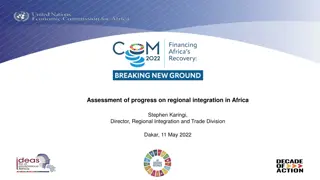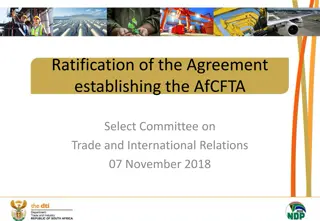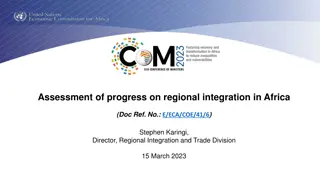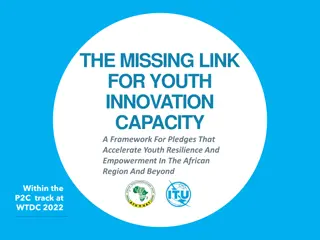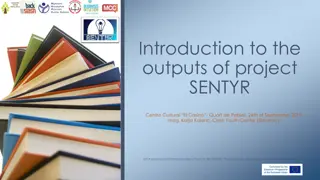Enhancing Youth Participation in the AfCFTA
Increasing youth involvement in the African Continental Free Trade Area (AfCFTA) is crucial for economic growth. Through addressing barriers, promoting innovation, and fostering entrepreneurship, the AfCFTA aims to unlock opportunities for youth, MSMEs, and the informal sector. This initiative can mitigate the impacts of COVID-19, create job opportunities, reduce trade barriers, and encourage inclusive development. By incentivizing digitalization, supporting value addition, and enhancing public-private dialogue, the AfCFTA seeks to nurture a more inclusive and sustainable trade ecosystem that benefits all stakeholders.
Download Presentation

Please find below an Image/Link to download the presentation.
The content on the website is provided AS IS for your information and personal use only. It may not be sold, licensed, or shared on other websites without obtaining consent from the author.If you encounter any issues during the download, it is possible that the publisher has removed the file from their server.
You are allowed to download the files provided on this website for personal or commercial use, subject to the condition that they are used lawfully. All files are the property of their respective owners.
The content on the website is provided AS IS for your information and personal use only. It may not be sold, licensed, or shared on other websites without obtaining consent from the author.
E N D
Presentation Transcript
Youth Participation in the AfCFTA Mie Vedel-Joergensen Regional Trade and Integration Division UNECA May 2022
Youth in the AfCFTA IMSMEs account for 80 pct. of Africa s businesses many are led by youth and women Various roles of youth in trade MSMEs, informal sector, SSCBTs, unbanked The informal economy is creates 20-75 percent of jobs Disparity between education and unemployment ECA Africa Renewal Magazine, 2014 Constraints: Access to assets, finance, markets, information, networks, skills, standards, technology Lacking inclusion in trade limits structural transformation of economies
Why the AfCFTA Removal of Tariffs Reduced Non-Tariff Barriers Access to wider markets Job creation Makes investments worthwhile Coherent trade policy Drives industrialisation Expands sectors Food security Develops regional value chains
Youth, innovation and entrepreneurship Enabling digital environment Skills training and free movement of persons Mentorship Digitalisation of SMEs COVID has supported this but barriers are more apparent Digitalisation of customs procedures to reduce discrimination Foster innovation and participation in the green economy Showcasing the innovations of youth on a national platform and engaging universities in skill development Inclusive tech design including NTB reporting mechanism
Expected benefits to youth, MSMEs, informal sector Mitigate COVID-19 impacts Create jobs in productive activities, reducing youth unemployment Address costs and barriers to trade Encourage entrepreneurship Support value addition through regional value chains, linkages, niche industries Encourage inclusive public-private dialogue and inclusive private sector associations Incentivise digitalisation, digital trade, and innovative finance Incentivise formalisation, investments, and trade through safer channels Address NTBs faced by small-scale and informal cross-border traders Highlight and advance complementary policies to support inclusion: Access to finance Skill upgrading Capacity building
Opportunities for collaboration and supporting inclusion Understand changes in operations as a result of AfCFTA: Regional value chains in products and services Investment opportunities Impacts on and opportunities for women- and youth-owned businesses and key sectors Bottlenecks/NTBs Supporting MSME competitiveness Market and supply chain linkages Invest in entrepreneurship & innovation, scale up what works Upgrade education, training, skill development (esp digital) Technical training in sectors likely to gain from trade
Policy Actions for Inclusive AfCFTA Implementaiton 1. Close the gap in access to finance 2. Build the export and trading capacity of SMEs, youth-led business in the AfCFTA 3. Support youth and SME participation in regional value chains, corporate supply chains and public procurement 4. Streamline border procedures to incentivise formalisation, implement STRs 5. Close the digital divide and leverage youth innovation to support participation in e-commerce and digital trade solutions 6. Plan innovative AfCFTA sensitization among stakeholder groups and inclusion of diverse voices in national implementation efforts
